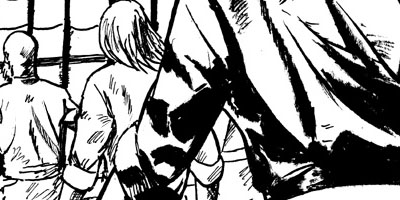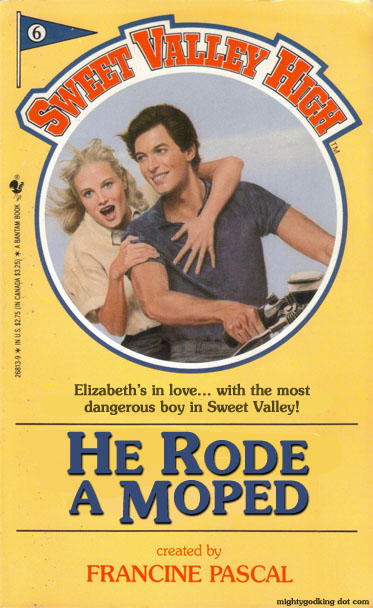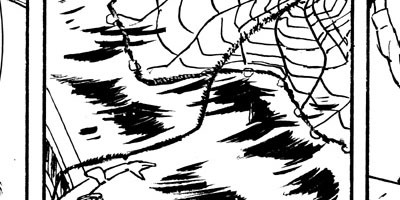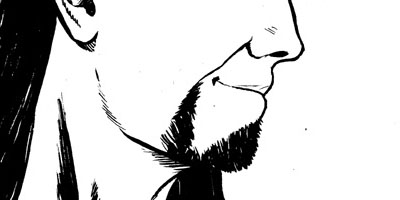My weekly TV column is up at Torontoist.
13
May
12
May
Recently, Disney/Lucasfilm made some fairly big news by announcing that they would be de facto decanonizing the Star Wars Expanded Universe. They’re doing it in a nice way, of course, by rebranding it as Star Wars Legends and continuing to make material for the fans who still love it and taking it to a farm where it will be much happier, but the long and short of it is that the stories a generation of Star Wars fans have accepted as the continuation of the universe…isn’t, anymore. And while a part of me is actually happy about this, on the grounds that it frees us from a lot of straitjackets (for one thing, I’ve always felt like people took Yoda at his word that there was no redemption once you started down the path of the Dark Side, when the conclusion to the trilogy was all about him being manifestly and self-evidently wrong), I think it’s worth trying to understand why people adored the Expanded Universe. And for that, I think it’s worth talking about West End Games.
Because when West End Games picked up the Star Wars license in 1987, the property was pretty much dead. The corpse was still twitching here and there, but it had been four years since the last movie and there was no sign from Lucas that he ever intended to film the promised prequels or the promised third trilogy (or the fourth trilogy that fans had heard rumors of based on third-hand rememberings of old magazine interviews…it was a pre-Internet era). There was no TV show, no cartoons or specials to perpetuate things, and the Marvel comic had just been canceled. Even the action figures were off the market. This was, pretty much, the nadir of Star Wars as a cultural phenomenon. Which first meant that West End could afford the license, but second and more importantly meant that they were the only game in town…figuratively, as well as literally.
And they did exactly what a game company does. They systematized and organized the fictional universe. Star Wars went from being three movies and a handful of ancillary material, all of which revolved around the adventures of a few specific people as they battled a few specific antagonists, to being a complete fictional environment that you could immerse yourself into for a few hours at a time. Things that Lucas had glossed over were given depth, weight and texture in order to satisfy people who wanted to play that weird looking thing in the back of the Mos Eisley Cantina. Vague mystical powers were given rules and rationales. And most importantly of all, you could enter that universe yourself. You could join in. It held a tremendously powerful allure for the Star Wars fanbase that was still out there and that wasn’t being served anywhere else.
It’s little wonder that the Star Wars novels felt like a natural outgrowth of the West End material, to the point where planets and technology first referenced in WEG sourcebooks became significant in the series. Likewise, given how starved for material they were, it’s no surprise that the WEG sourcebooks synergistically fed off that new material in the 1990s and detailed it for their games. The West End Star Wars was an incubator, a crucible where new ideas and new material could be tested and refined for an audience of devoted fans before it went mainstream again. And the fans who were around during that time, who were the most loyal of all because they cared about it when nobody did, all identified with that material strongest of all because it was theirs in a way no other form of Star Wars could be. I might not be a huge fan of the EU, but I can certainly understand that.
Plus, it was just a fun game. Any game where you get to roll more dice as you become more powerful has a certain cachet that mere “+X modifiers” can’t match. There’s nothing quite like the thrill of rolling a double-handful of six-siders and realizing you’re absurdly bad-ass in a clear, tangible way. West End Games helped Star Wars fandom get through the hardest time, and Star Wars still bears the stamp of its influence. And despite it all, I feel like that’s a good thing.
7
May
In my email inbox today, in regards to this post from 2011:
SUBJECT: Sad, racist and delusional
It’s not often that someone matches all three descriptions, you should be proud in a weird way.
You writing a blog post about how GRRM is wrong about the race of the characters he created was one of the saddest and weirdest things someone could possibly do.
Besides the obvious fact that he described swarthy Southern Europeans in the book, he flat out confirmed this multiple times by saying he always imagined the Dornish as Southern European.
The fact that this reality bothers you so much is indicative of a deep sense of insecurity.
If you don’t like A song of ice and fire or the TV series because they are “too white” why don’t you create your own instead of trying to harass and guilt trip an author into creating affirmative action characters to please people like you?
If you have a problem with too many white people in a story and a universe created by a white person, why don’t you stop reading and stop watching?
White people will never complain about the “lack of diversity” in predominately African/Asian/Arab films, entertainment media and literature, because we are not pathetic losers with serious self esteem issues like you.
Also the funniest part, even if Dorne was the Middle East, or North Africa or even just modern day Turkey(and per the author, it isn’t) that guy from the Indian subcontinent who even by Indian standards is incredibly dark, would have no place representing those regions as he does not look like any of those people, whether Arab/Turk/Persian or even Israeli, that last image confirmed to me your racism and your delusion.
A few points, I think, need to be made here.
1.) I am white as all get out, so suggesting that that argument was made on the basis of insecurity about my own race is kinda fun to say the least.
2.) “Why don’t you create your own” – er, I did.
3.) Naveen Andrews is not “incredibly dark” by Indian standards. If anything he’s relatively light-skinned as Indian folks go. And he’s not from “the Indian subcontinent,” he’s from friggin’ London, born and raised.
I could go on – including the fact that GRRM made his qualifications about the Dornish mostly after that blog post, in part to respond to suggestions like mine – but yeeeeeeeeeeah.
6
May
It’s been a while since we did one of these
Posted by MGK Published in Bad Comedy, Books, Photoshopp'd5
May
Stay tuned for twelve exciting hours of nobody going to the bathroom
Posted by MGK Published in The Internets, TVMy weekly TV column is up at Torontoist.
5
May
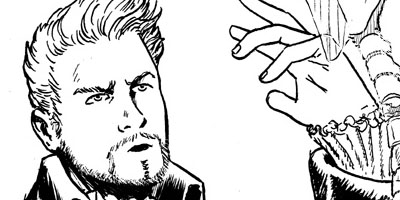
Click on thumb to see full
As always, you can also go to the dedicated Al’Rashad site.
2
May
Allow Me To Chime In For a Moment
Posted by John Seavey Published in Comics, General Nerd Crap, My Readers Got CommentsRecently, MGK made a delightful post in which he calmly and eloquently asked all of the sexist/racist/homophobic assholes in fandom to kindly fuck off out of our collective lives. I wholeheartedly approve of this gesture. This probably doesn’t surprise many people, because if I wasn’t the sort of person that wholeheartedly approved of this gesture, I wouldn’t have been the kind of person who gets asked to do guest columns for a site that makes this gesture.
The post spawned comments, which is unsurprising. One of the occasional themes in these comments was, “But if these people fuck off out of our collective lives, how will we ever convince them to be better people? We can’t be continually hostile to them. We have to engage them and sway them with well-reasoned discussion instead of attacking them.” This is a theme I wanted to address further, while making it very clear that I am not speaking for the site, only for myself, and that MGK reserves the right to make his own further responses on this topic. With that said, here goes.
This is an understandable impulse. We all understand the way that people get defensive when someone makes them feel like they’re in the wrong, and we all want to believe that we can bring people around to our point of view. Plus, there is kind of a deep-seated social conditioning against actively telling someone, “Fuck off out of our collective lives”, at least directly to their face. So I can get wanting to find a different way to handle the racist/sexist/homophobic assholes.
But that presumes that these people are arguing in good faith. It takes as a basic assumption that when someone shows up on a message board, forum, comments section, private email of a person who criticized their favorite comic book, voicemail of someone whose phone number they dug up, whatever, that they are attempting to engage in an actual discussion about the subject of whether sexism/racism/homophobia in comics and fandom is genuine and undesirable. And it also assumes that even though they have staked out a position and feel strongly about it, they are willing to listen to counter-arguments.
This is obviously wrong. If someone has gotten to the point where they say this (which is an actual motherfucking thing that was actually sent to Janelle Asselin):
“Women in comics are the deviation, the invading body, the cancer. We are the cure, the norm, the natural order. All you are is a pair of halfway decent tits, a c*nt and a loud mouth. But see, it doesn’t matter how loud you get. It doesn’t matter how many of your lezbo tumblr and twitter fangirl friends agree with you and reinforce your views. You can be all “I’m not going to be silent about misogyny so f*ck you!” all you want. In the end all you are is a pathetic little girl trying to effect change and failing to make a dent. You might as well try to drain the ocean of fish. That’s the kind of battle you face with people like me. We won’t quit. We won’t stop attacking. We won’t give up. Ever.”
Then I think it’s pretty goddamn safe to say that they are no longer arguing in good faith. At that point, I think it’s pretty motherfucking safe to say that their only intention as far as engaging you in dialogue is concerned is to punish you for continuing to talk. This is not speech as an exchange of ideas. This is speech used as a weapon to threaten, harass and intimidate. There is no longer any point in attempting to discuss the issue with these people. At this point, all you can really do is fight back.
So yes. This is the point where people like me make it clear to people like whoever wrote that message that no, they will quit. They will stop attacking. They will give up. Because people like me will shout them the fuck down just the same way they’re trying to shout down women in comics. And despite their pathetic, miserable, whiny delusions, there are more of us and we are louder than they are. And yes, this means that they may never change. They may persist in the belief that they’re the real victim here, and we may never have the chance to convince them otherwise.
But at least they’ll shut the fuck up about it, which is more than they’re doing now.
29
Apr
I keep meaning to post about how fanboy nerds are treating girls awfully but the problem is that I sit down to write the post and then BAM something new happens. Like, there was that “I hate fangirls” tee-shirt brouhaha and I was going to post about that but then like not two days later somebody tried to break into Janelle Asselin’s bank accounts because they didn’t like how she pointed out that a shitty comic book cover was shitty, and when it’s not comics nerds it’s corporations more or less saying girls can’t be Spider-Man and it never ends. Writing a pithy post that adequately sums up my feelings about all of this is essentially impossible because a certain subsection of nerds seem determined to never, ever stop being terrible people, and put all of their energy into being terrible people, and make sure that they win simply by exhausting anybody who’s even halfway decent.
Anyway. I am mostly powerless about this, but I do have one response, and that is to take a page from Kurt Cobain:
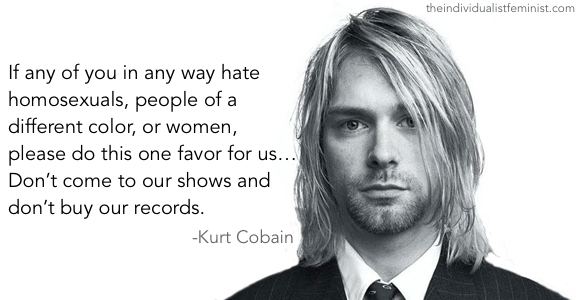
I write a blog, I does a Twitter, I make comics. And this one goes out to the dickheads out there who seem determined to make life as difficult as possible for fangirls and geek girls and girls generally: don’t read my stuff. Just pass it by. I will make do without your eyeballs, attention, and (when there is opportunity for you to spend) monies. You are not needed; you are the fleshy little wart on the ass of Life, purely extraneous and mostly unpleasant, and I don’t want your business.
And for everybody else who makes comics – or other nerd stuff – you should be telling these people the exact same thing. You’ve probably been implying it anyway, but it’s time we all vocalized it.
28
Apr
If they had a competition of MasterChef winners, would they call it MasterMasterChef?
Posted by MGK Published in The Internets, TVMy weekly TV column is up at Torontoist.
22
Apr
Plague Inc. You ever get frustrated with a game because it’s got a great idea and then simply doesn’t go deep enough with it? Plague Inc. is one of those games. Take the old Pandemic II skeleton, put more options into it, really have fun with it. And in some ways Plague Inc does that because they put in a lot of new game modes – Neurax Worm and Necroa Virus are both interesting, fun ideas for a plague game to tinker with. But the problem with this game is that in most of the modes, there is exactly one way to realistically win: lurk in the background for a long time with as little visibility as possible until the entire world is infected, and then turn on fatal symptoms immediately. In short, the only way to win the disease game is to make sure your game doesn’t play anything like diseases actually do. And that’s kind of boring.
The latest episode of Game of Thrones. Depending on which showrunner you’re interviewing this week, you’ll get a different answer about whether Jaime raped Cersei or whether she was into it. (HINT: the first one is the one who’s right. You are entitled to slap anybody across the face for advancing the “she was into it” argument.) But of all the changes the show has made from the books, this one is by far the worst so far. I vaguely suspect it was done to humanize Cersei because Cersei is so awful that in order for anybody to feel sympathetic towards her something really awful has to happen, but here’s the problem: nobody needs to feel sympathetic towards Cersei. She is a villain, and that’s fine, and her villainy actually comes from a perfectly reasonable place (her anger at her relative lack of power as a woman, even as a noble). Choosing to have her be raped is a cheap plot point, and although Game of Thrones is usually a well-written show I don’t think it has the narrative room by half to dwell on the ramifications of the sexual assault in a way that would make it worth including in the narrative. (For the record, Sons of Anarchy did it very well in the second season and should probably be considered the model for “if you must do a sexual assault storyline, this is how.”) Just a terrible idea on so many levels.
The end of Superior Spider-Man. Maybe “sucked” is too strong here because this was not a bad comic especially – but after a superhero comic run as refreshing and solidly entertaining as Superior was, it definitely limped to the finish. Otto’s heroic sacrifice was a wet fart of an ending for his character arc, the most blatant “we’re doing a retcon of this entire storyline because we have to, okay” that I’ve seen in some time. Ditto Peter’s return, which was just… bad, a deus ex machina without the machina bit, expressly rewriting what had gone before in the comic – and you have to figure it’s because the movie’s coming out in a month and we need the status quo back for the movie. Slott is still writing good stuff here, overall, and the last issue is reasonably entertaining and it’s nice to see Peter in the costume again, but that doesn’t really change the fact that a remarkably good comic dropped to “basically acceptable” right at the end.
21
Apr
The best bit is when Richard Hammond keeps swerving needlessly
Posted by MGK Published in The Internets, TVMy weekly TV column is up at Torontoist.
Search
"[O]ne of the funniest bloggers on the planet... I only wish he updated more."
-- Popcrunch.com
"By MightyGodKing, we mean sexiest blog in western civilization."
-- Jenn
Contact
MGKontributors
The Big Board
MGKlassics

Blogroll
- ‘Aqoul
- 4th Letter
- Andrew Wheeler
- Balloon Juice
- Basic Instructions
- Blog@Newsarama
- Cat and Girl
- Chris Butcher
- Colby File
- Comics Should Be Good!
- Creekside
- Dave’s Long Box
- Dead Things On Sticks
- Digby
- Enjoy Every Sandwich
- Ezra Klein
- Fafblog
- Galloping Beaver
- Garth Turner
- House To Astonish
- Howling Curmudgeons
- James Berardinelli
- John Seavey
- Journalista
- Kash Mansori
- Ken Levine
- Kevin Church
- Kevin Drum
- Kung Fu Monkey
- Lawyers, Guns and Money
- Leonard Pierce
- Letterboxd – Christopher Bird - Letterboxd – Christopher Bird
- Little Dee
- Mark Kleiman
- Marmaduke Explained
- My Blahg
- Nobody Scores!
- Norman Wilner
- Nunc Scio
- Obsidian Wings
- Occasional Superheroine
- Pajiba!
- Paul Wells
- Penny Arcade
- Perry Bible Fellowship
- Plastikgyrl
- POGGE
- Progressive Ruin
- sayitwithpie
- scans_daily
- Scary-Go-Round
- Scott Tribe
- Tangible.ca
- The Big Picture
- The Bloggess
- The Comics Reporter
- The Cunning Realist
- The ISB
- The Non-Adventures of Wonderella
- The Savage Critics
- The Superest
- The X-Axis
- Torontoist.com
- Very Good Taste
- We The Robots
- XKCD
- Yirmumah!
Donate
Archives
- August 2023
- May 2022
- January 2022
- May 2021
- January 2021
- December 2020
- October 2020
- June 2020
- March 2020
- January 2020
- December 2019
- October 2019
- February 2019
- January 2019
- December 2018
- April 2018
- March 2018
- February 2018
- January 2018
- December 2017
- November 2017
- October 2017
- February 2017
- January 2017
- December 2016
- November 2016
- October 2016
- September 2016
- August 2016
- July 2016
- June 2016
- May 2016
- April 2016
- March 2016
- February 2016
- January 2016
- December 2015
- November 2015
- October 2015
- September 2015
- August 2015
- July 2015
- June 2015
- May 2015
- April 2015
- March 2015
- February 2015
- January 2015
- December 2014
- November 2014
- October 2014
- September 2014
- August 2014
- July 2014
- June 2014
- May 2014
- April 2014
- March 2014
- February 2014
- January 2014
- December 2013
- November 2013
- October 2013
- September 2013
- August 2013
- July 2013
- June 2013
- May 2013
- April 2013
- March 2013
- February 2013
- January 2013
- December 2012
- November 2012
- October 2012
- September 2012
- August 2012
- July 2012
- June 2012
- May 2012
- April 2012
- March 2012
- February 2012
- January 2012
- December 2011
- November 2011
- October 2011
- September 2011
- August 2011
- July 2011
- June 2011
- May 2011
- April 2011
- March 2011
- February 2011
- January 2011
- December 2010
- November 2010
- October 2010
- September 2010
- August 2010
- July 2010
- June 2010
- May 2010
- April 2010
- March 2010
- February 2010
- January 2010
- December 2009
- November 2009
- October 2009
- September 2009
- August 2009
- July 2009
- June 2009
- May 2009
- April 2009
- March 2009
- February 2009
- January 2009
- December 2008
- November 2008
- October 2008
- September 2008
- August 2008
- July 2008
- June 2008
- May 2008
- April 2008
- March 2008
- February 2008
- January 2008
- December 2007
- November 2007
- October 2007
- September 2007
- August 2007
- July 2007
- February 2007
Tweet Machine
- No Tweets Available
Recent Posts
- Server maintenance for https
- CALL FOR VOTES: the 2021 rec.sport.pro-wrestling Awards
- CALL FOR NOMINATIONS: The 2021 rec.sport.pro-wrestling Awards (the Theszies)
- The 2020 RSPW Awards – RESULTS
- CALL FOR VOTES: the 2020 Theszies (rec.sport.pro-wrestling Awards)
- CALL FOR NOMINATIONS: The 2020 Theszies (rec.sport.pro-wrestling awards)
- given today’s news
- If you can Schumacher it there you can Schumacher it anywhere
- The 2019 RSPW Awards – RESULTS
- CALL FOR VOTES – The 2019 RSPW Awards (The Theszies)
Recent Comments
- Harley in Thursday WHO'S WHO: Tim Trench
- George Leonard in When Pogo Met Simple J. Malarkey
- Blob in How Jason Todd Went Wrong A Second Time
- Cindi Chesser in Thursday WHO'S WHO: The War Wheel
- Scott Hater in Bing, Bang, Bing, Fuck Off
- dan loz in Hey, remember how we talked a while a back about b…
- Sean in Server maintenance for https
- Ethan in CALL FOR VOTES: the 2021 rec.sport.pro-wrestling A…
- wyrmsine in ALIGNMENT CHART! Search Engines
- Jeff in CALL FOR VOTES: the 2021 rec.sport.pro-wrestling A…
